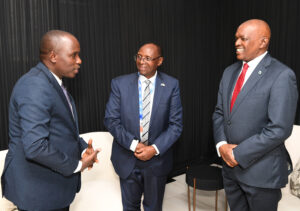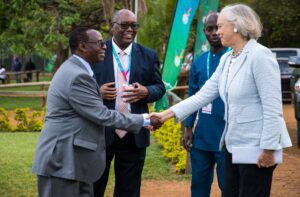Ghana’s President Nana Akufo-Addo and NMG Chairman Wilfred Kiboro admire an elephant carving.
Speaking during the Third edition of the Kusi Ideas Festival in Accra, Ghana, Dr Sylvia Vito, the SAFRICA HEAD – Acceleration South Africa, Sub Sahara Africa, French Africa at AstraZeneca said that as much African governments have done better in vaccinating their populations, there are as still room to do more in the fight against Covid-19 in the continent.
“We have to recognise the efforts done by governments. It’s been tough and the challenges a year later have exposed the vulnerability of the continent, we can still do better,” Dr Vito said.
AstraZeneca has managed to offer two thirds of vaccines to third world countries with 45 million coming to Africa. Others include those from Moderna and Johnson & Johnson among others.
“We started well but with the Indian ban on vaccine exports, the vaccination campaign in developing countries slowed down. In the last two months, we have delivered 17.5 million vaccines across Africa,” she said.
Vaccine access
According to Africa CDC, under 10 per cent of the continents population has been fully vaccinated, against a target of 40 per cent as per the World Health Organization (WHO). The low vaccination numbers have been attributed to poor vaccine access coupled with apathy driven by myths and fears.
“Yes we do have barriers as a content. But we also have to appreciate the efforts made and so much to ensure the vulnerable aren’t exposed. As scientists, we can confirm that the latest variant is still within the containment of the testing and vaccines available,” Dr Vito said.
She added: “We need to see at least 40 per cent vaccinated before we even think of booster shots. The booster conversation isn’t something Africa should even have. Instead, the continent should get its attention at getting as many adults as possible to be vaccinated.”
Dr. John Mark Bwanika, the Director of Operations Rocket Health Africa said that Covid-19 has shown that Africa needs to move much faster.
“The pandemic has given us a boost to improve our health infrastructure. We need to pick lessons from unique vaccination rollouts across Africa with model countries like Rwanda having a lot to be emulated. We have seen misunderstandings in the rollout that slowed the process but now the drive is picking up,” Dr Bwanika said.
Mr Charles Abugre, a member of the programme advisory committee at Christian Aid lamented the cost of vaccine acquisition for the continent.
“We are paying far more for the vaccines than the rich countries. At $10 a dose, that’s too much for the continent to bear. This is despite the huge costs of the vaccines,” Mr Abugre said.
He added; “We recognise the need for the vaccine forms to make a return for investment but there must me a limit. Vaccines economics demand that we must aggressively support governments that seek to manufacture vaccines to make this affordable.”
The panelist also slammed the West over the current vaccine politics, which they said was a repeat to the 1990s’ HIV/Aids ARVs access fight.
“There is a vaccine apartheid against Africa and we need vaccine justice. At this point, we need to retain every dollar to invest within the continent. And that’s why we must ask for low vaccination costs,” Mr Abugre said.
“Western countries have failed to live to their words. We were told no one is safe until we all are fully vaccinated and yet we see vaccine hoarding which puts us at a bad position. How then do we achieve the numbers when we don’t have the support to access vaccines?,” he asked.
The panelist also waded I to the current afrophobia that has seen parts of Southern Africa red listed by over 30 countries over the latest Omnicron variant. He termed this as ‘unfortunate and illogical.”
“Any form of virus will always mutate, the closure of borders has less to do with science but political. We are proud of what the scientists did. Mutations happen but we should be okay that omicron is not an escapable variant-from testing and vaccination,” Dr Vito said.




